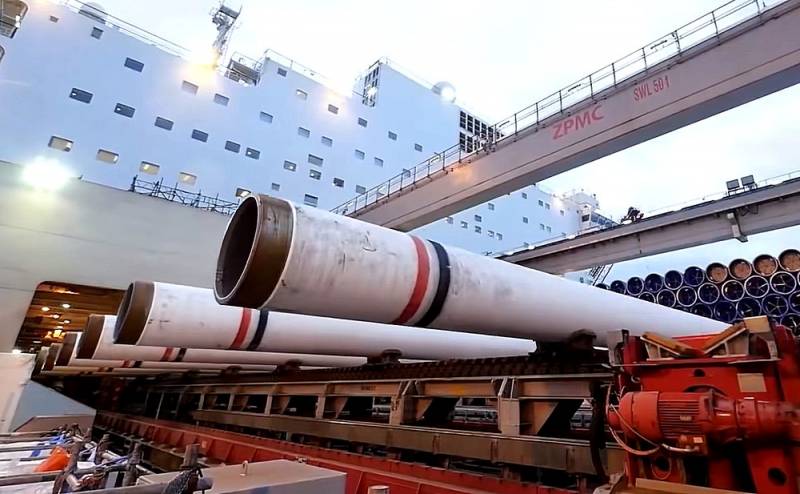Nord Stream 2 may turn into a legal long-term construction
The Nord Stream 2 gas pipeline was physically completed by early September 2021. At Gazprom, with bated breath, they were counting down the days until the end of the 4-month period allotted for certification and admission of the pipeline to work. Against the backdrop of the energy crisis and abnormal gas prices in the European Union, the matter seemed already settled. Alas, the opponents of Russian-German economic cooperation also did not sleep and did everything to turn the project into a new "long-term construction", now a legal one.
Two days ago, on November 16, the Federal Networks Agency (BNetzA) of Germany decided to temporarily suspend the certification of Nord Stream 2. The reason was that Gazprom did not fulfill the requirements of the European Union norms on unbundling, and now the optimistic deadlines for completing certification have been shifted from the beginning of January 2022 to at least March, when the heating season ends and the demand for additional gas volumes in the EU will decrease. How did it happen?
Unbundling we forgot about
The problems of Nord Stream 2 are now of a purely legal and organizational nature. Distinguish technical pipeline certification and legal certification of its technical operator. The fact is that, according to European antimonopoly rules, a company that produces or supplies gas does not have the right to transport (pump) it. This is called an ownership unbundling requirement. The EU extended its regulations to pipelines from third countries in 2019.
The difficulty lies in the fact that Gazprom does not fully comply with this requirement. The operator of Nord Stream 2 is a 100% subsidiary of the Russian monopoly, Nord Stream 2 AG, registered in Switzerland. That is, both commercial structures are legal entities of non-EU countries, which further confuses the matter. In July 2021, Nord Stream 2 AG applied for certification as a pipeline operator, but two days ago it was refused by Germany. The Federal Network Agency demands that another subsidiary be created, this time from the Swiss division of Gazprom, registered in Germany, which will manage the German section of Nord Stream 2. This creates two problems at once.
At first, for the period of settling the issue of registering a new subsidiary as an operator, the process of technical certification of the pipeline itself is suspended. True, BNetzA promises to resume the process from the same moment when it was suspended, taking into account the already passed procedural terms (2 months and 1 week).
Secondlydespite the favorable position of the German regulator, the deadlines are beginning to stretch inexorably. If the certification procedure resumes after the New Year holidays, it will end closer to March. After that, BNetzA will submit its opinion to the European Commission, which will have 2 months to make its decision. However, experts draw attention to the fact that the EU has the right to request another 2 months for additional consideration. If the decision is positive, then the German regulator, in turn, will receive another 2 months to prepare and announce its decision.
As you can see, the terms are all stretched and stretched. And this is on condition that everything will be fine. If the position of BNetzA and the European Commission diverge in some way, the latter has the right to file a claim with the European Court of Justice in Luxembourg. Where can a discrepancy arise?
"Fortune" turned away
Let's pay attention to two more very important points.
On the one hand, a whole line of ill-wishers has already lined up who will participate in the Nord Stream 2 certification process. This is the Polish state energy corporation and the Ukrainian Naftogaz with the Ukrainian GTS Operator, as stated in BNetzA:
The Federal Network Agency can confirm that today it has attracted the companies "Naftogaz of Ukraine" and "Operator of GTS of Ukraine" to the certification procedure.
In our country, the alarmed public is reassured by the fact that these structures will not have the right to veto. Allegedly, this is how Germany seeks to "spread straws" in order to show that it hears all its partners. Say, the Poles and Ukrainians will speak out, and then the Germans will simply do what they need.
On the other hand, this position contains a lethal dose of naivety. We all believe that it is impossible to find fault with Nord Stream 2, but this is not entirely true. In Kiev, they directly indicate where they will hit next.
Recall that the Swiss contractor Allseas abandoned the almost completed pipeline, and Gazprom had to complete the work on its own. In this case, the barge "Fortuna" was involved, which is not equipped with a dynamic positioning system, in contrast to the Swiss pipe-laying vessels. This alone gives grounds for speculation that Gazprom might not have fulfilled all the conditions of the project documentation. This allegedly casts doubt on the stress tolerance of an underwater pipeline built by inexperienced hands using a barge not equipped with the required equipment.
Here's how things can turn out in the end. Three persons interested in disrupting the project were involved in certification at once, one Polish and two Ukrainian. They can shower the courts with claims demanding, if not a refusal to operate Nord Stream 2, then a decrease in internal pressure in it, that is, throughput, to ensure security. If their position is supported by the European Commission, then this is the basis for the conflict between Berlin and Brussels, as we mentioned above. In other words, the "Nord Stream-2" is now in danger of becoming unfinished, already a legal one.

Information